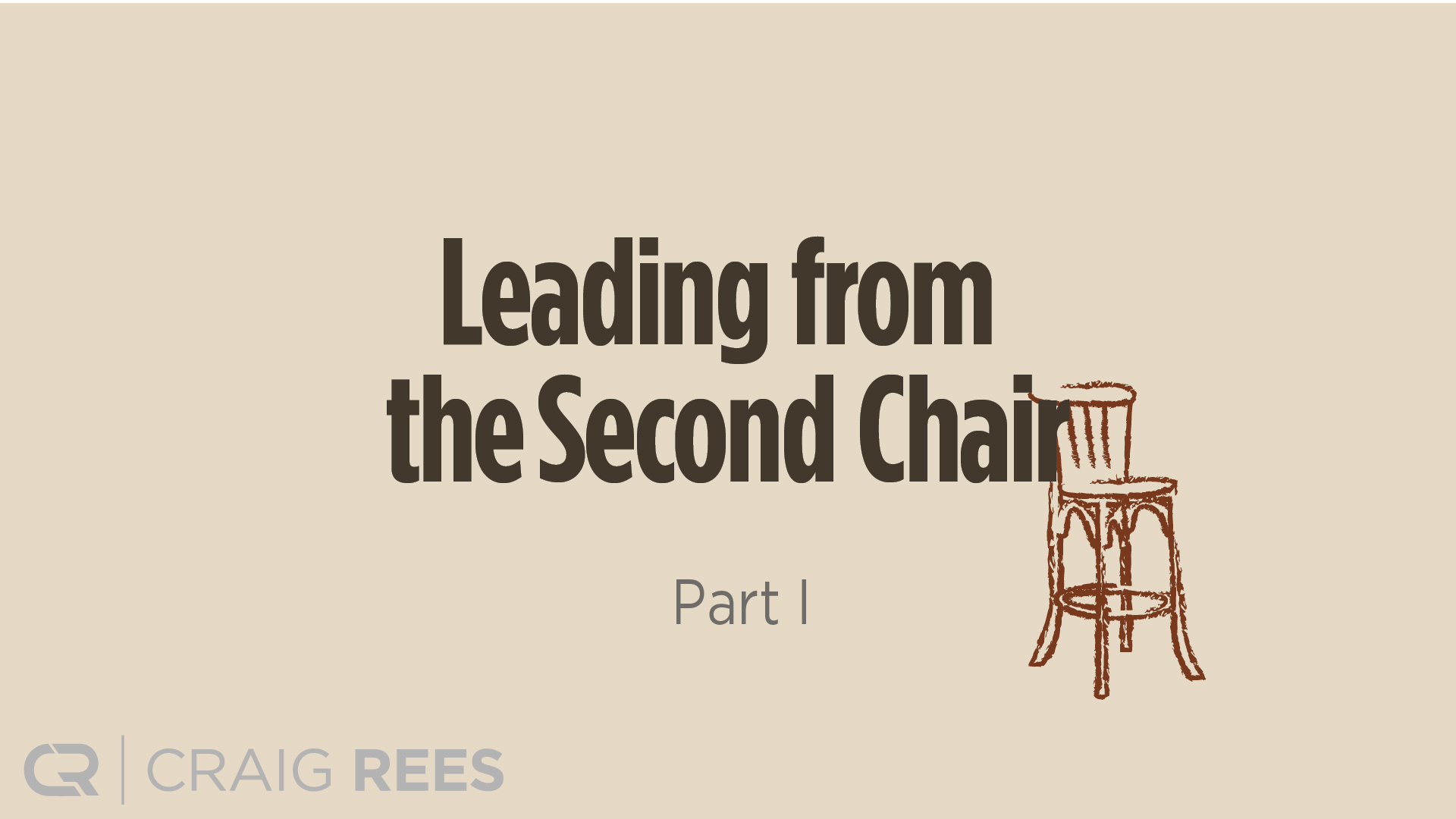Leading from the Second Chair (Part 1)
This is the first of two blogs I will post before my next message in the Embracing Exile series on December 13, 2020. I am thankful that the Rees Family COVID battle seems to be behind us and I am looking forward to stepping back into action just in time for the Christmas push!
In my next blog, I will share seven traits of a courageous convictional Christian drawn from the book of Esther. The book of Esther will be my text on December 13. I was due to teach this theme on November 29, 2020, but my family’s COVID battle caused us to rearrange the order of the series. As Toran pointed out, it is hard teaching through an entire book. For those of you who want to come prepared to engage, I am going to provide key lessons from the book that I won’t have time to cover in the message.
Today I want to recap and unpack some things I said in the first week of the series.
In week 1 of our Embracing Exile series I referred to the importance of “leading from the second chair."
“Leading from the second chair” is defined by Mike Bonem and Roger Patterson, in their book of the same name, as “subordinate-leaders.” Subordinate leaders, while not holding the authority nonetheless possess a broad perspective of their organization and a deep understanding of their own area of excellence.
Within the context of our exile series, my reference to “second chair leaders” is used to suggest that in the emerging secular America, every Christian, from CEO to custodian, will find themselves living under the authority of values, and the supporting policies produced for them, that run counter to their convictions as Christians.
In this Embracing Exile series, I am not suggesting that these shifts don’t matter. What I am suggesting is that to thrive in the mission of Christ, convictional Christians must engage with the new culture albeit from an “exile” mindset. The shift in mindset is necessary because convictional Christians will be a minority in culture.
To make this shift we’ll need to adopt the “aliens and strangers” mentality prescribed to the church by the apostle Peter (1 Peter 2) and the author of Hebrews (11:13-16). We’ll need to accept that this world, and even this nation, is not our eternal home and that we are children of God through faith in Jesus Christ (John 1:12; Galatians 3:26) and citizens of heaven (Philippians 3:20) first and foremost.
I am convinced that the pending change in government and the impact of COVID will propel convictional Christians into a more secular America far more quickly than many of us could have imagined as we started the year. Many already find themselves living out their faith in environments where the future for us is a present reality for them.
How do we respond to this?
First, convictional Christians need to find a healthy perspective on love for God and love for country. In his book, American Exceptionalism and Civil Religion: Reassessing the History of an Idea, John D. Wisely says:
“At the heart of what it means to be an American is the act of calling America back to faithfulness to its first principles motivated by authentic patriotism” (p. 217).
Among these first principles for Wisely are rights, freedom, and equality.
I recommend Wisely’s book for anyone seeking to dig into the conversation about what it means to be an American and a Christian. His presentation of the differences between “closed” and “open” exceptionalism, and his critique of “closed exceptionalism” is extremely helpful.
I refer to his work because it is an excellent resource. I also refer to it because me not emanating from these shores has led some to question my agenda. Wisely says it is possible to be a Christian and a patriotic American and his book is an excellent resource for American Christians trying to wrestle that through.
For a review of the book, I’d recommend Jonathan Leeman’s article, “An Exceptional Crisis,” in Providence: A Journal of Christianity and American Foreign Policy (Spring 2017/Number 7). Leeman agrees with the difficulties of believers’ holding to “closed exceptionalism”...
“The danger of treating the nation like God’s chosen people, aside from perverting the real gospel and misusing Scripture, is that it creates a people who sanctify all their transgressions and prejudices under the holy cloak of a divine mission or “manifest destiny” (p. 72) – ouch!
By putting both resources together you’ll have a fairly good grip on the theological and ideological challenges convictional believers face in trying to stay faithful to Christ in a nation they love and believe to be “special.”
Second, I remain convinced that engaging in the continued combative behavior ravaging our nation over the past few years will further isolate us from the people we are called to reach. Ed Stezter, in his book, Christians in the Age of Outrage, illustrated the danger of allowing our righteous anger—which is Scriptural—to continue to lead us into unrighteous rage—which is not Scriptural.
What I’m suggesting is that embracing the exilic mindset offers us a framework through which to fight the culture war a different, dare I even say, a Scriptural way.
The metaphor I used to typify this new approach is that of the military medic. In the changing landscape of war, military medics are often armed, and sometimes have to offer “care under fire.” The symbol of the military medic is an apt description of where convictional Christians living in a more secular America may well find themselves.
The five-letter MEDIC acrostic deals with our emotional posture first. As we process our pain and loss (m = mourn) we must do so with full confidence in God’s sovereign rule (e = expect). This is not the time for pain of loss to paralyze Christians to the power of God. Remember, in the embracing exile series the loss of which we speak is having the majority say in a land we love. Convictional Christians across the world have frequently experienced what we are about to experience but God did what God always does—come through. In difficult seasons we have to guard our emotions against despondency and self-doubt—two experiences combat medics know only too well.
The next phase refers to three specific actions on the “battlefield.” We must DISCERN what to fight and how to fight (Daniel), commit to being a positive, healing INFLUENCE, and CONTRIBUTE to the creation of a new culture (Jeremiah 29), one that reflects God’s will. Someone has said that culture, like energy can be neither created nor destroyed, only reshaped. Through discernment and influence we can contribute to the reshaping of culture through living out the values of the kingdom of God.


Leave a Comment